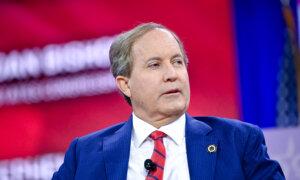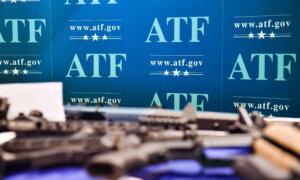The rule pertains to how many firearms an individual citizen can sell before they are considered a gun dealer.
Rep. Matt Gaetz (R-Fla.) accused the Bureau of Alcohol, Tobacco, Firearms and Explosives (ATF) of exceeding its authority while drafting a new rule that critics warn targets private gun sales.
An earlier definition stated that individuals are deemed to be engaged in the business if they do so “with the principal objective of livelihood and profit.” ATF’s new rule amended the definition to any person who sells firearms to “predominantly earn a profit.”
In his reply, Mr. Dettelbach said that such a judgment would be made based on factors that are “conduct-based, not numerical-based.”
The GOP lawmaker criticized the explanation, pointing out that when a person is selling guns, they need to know how many they can sell before being considered to be “engaged in the business” of firearms and thus classified as a dealer.
When the DOJ announced the updated definition in April, Attorney General Merrick B. Garland justified the rule, saying it would protect lives.
“Under this regulation, it will not matter if guns are sold on the internet, at a gun show, or at a brick-and-mortar store: if you sell guns predominantly to earn a profit, you must be licensed, and you must conduct background checks,” he said. “This regulation is a historic step in the Justice Department’s fight against gun violence. It will save lives.”
At the time, Mr. Dettelbach said there was a “large and growing black market” for guns being sold by people doing such business without carrying a proper license.
During the hearing, Mr. Gaetz pointed to the decision of U.S. District Judge Matthew J. Kacsmaryk from Texas, who halted the implementation of the ATF rule for three reasons.
One of the reasons was that there’s “no minimum requirement” of gun sales to be potentially considered a gun dealer, Mr. Gaetz noted.
In his decision, the judge raised apprehensions about an ATF rule provision that “even a single firearm transaction or offer to engage in a transaction … may be sufficient to require a license.”
The GOP lawmaker noted that the Texas court judged the ATF has “in fact exceeded” its authority. The Congress “would have never allowed” a vague definition to determine who is engaged in gun sales, he said.
“There’s a second reason that court in Texas said that this would not have effect. And it’s that actual profit is not a requirement of the statute, only the predominant intent for profit.”
In the ATF rule, “even if someone isn’t turning a profit but they might want to turn a profit, they could be subject to this regulation in the court,” the lawmaker said.
Circumventing Safe Harbor, ATF Crackdown
The third reason cited by the Texas court was that the ATF rule “arbitrarily eviscerates the safe harbor for provision,” Mr. Gaetz pointed out.
The safe harbor provision makes it clear that people engaged in the occasional sale, exchange, or purchase of a firearm for personal collection or hobby are not subject to the firearm dealer law.
“But what the court is saying here in blocking your rule is that you have eviscerated the safe harbor that exists for the hobbyist,” Mr. Gaetz said.
By doing so, the ATF exceeded Congress’ statute and created a situation where there was no discernible way for people to comply with the law, he argued.
“The reason I think you guys are doing that is you want to make it more difficult for people to engage in the legal, lawful, and constitutionally contemplated manner to transfer firearms, and you’re trying to criminalize an entire enterprise. And that’s why you see us trying to curtail some of your funding and your authorities.”
During the hearing, the ATF director was also questioned by Rep. Tom McClintock (R-Calif.), who noted that the number of voluntary closures among firearms businesses post-ATF inspection has “risen sharply” from 24 in 2021 to 80 in 2023.
“This tells me that this is a deliberate policy to drive firearms dealers out of the business, not only with the reign of legal terror, but in the case of Mr. Malinowski, the actual reign of physical terror as well,” the Republican said.
He came under ATF scrutiny for allegedly buying and selling a large number of firearms at gun shows and through private sales. The incident happened before the ATF changed the definition of “engaged in the business” of firearms sales.
Responding to Mr. McClintock’s question, Mr. Dettelbach claimed that ATF only takes action when there are “willful violations that impact on public safety, like refusing to run a background check, selling to a felon” and not on paperwork violations.
When asked about the ATF rule that even a single transaction could be sufficient to classify a person as a dealer, the ATF director said that it was just “one sentence out of a 16-page rule.” The agency only makes a determination after taking into account “the totality of circumstances.”
The Epoch Times reached out to the ATF for comment.
Original News Source Link – Epoch Times
Running For Office? Conservative Campaign Consulting – Election Day Strategies!


